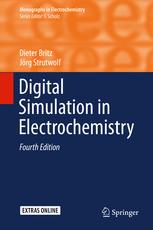

Most ebook files are in PDF format, so you can easily read them using various software such as Foxit Reader or directly on the Google Chrome browser.
Some ebook files are released by publishers in other formats such as .awz, .mobi, .epub, .fb2, etc. You may need to install specific software to read these formats on mobile/PC, such as Calibre.
Please read the tutorial at this link: https://ebookbell.com/faq
We offer FREE conversion to the popular formats you request; however, this may take some time. Therefore, right after payment, please email us, and we will try to provide the service as quickly as possible.
For some exceptional file formats or broken links (if any), please refrain from opening any disputes. Instead, email us first, and we will try to assist within a maximum of 6 hours.
EbookBell Team

4.4
52 reviewsThis book explains how the partial differential equations (pdes) in electroanalytical chemistry can be solved numerically. It guides the reader through the topic in a very didactic way, by first introducing and discussing the basic equations along with some model systems as test cases systematically. Then it outlines basic numerical approximations for derivatives and techniques for the numerical solution of ordinary differential equations. Finally, more complicated methods for approaching the pdes are derived.
The authors describe major implicit methods in detail and show how to handle homogeneous chemical reactions, even including coupled and nonlinear cases. On this basis, more advanced techniques are briefly sketched and some of the commercially available programs are discussed. In this way the reader is systematically guided and can learn the tools for approaching his own electrochemical simulation problems.
This new fourth edition has been carefully revised, updated and extended compared to the previous edition (Lecture Notes in Physics Vol. 666). It contains new material describing migration effects, as well as arrays of ultramicroelectrodes. It is thus the most comprehensive and didactic introduction to the topic of electrochemical simulation.